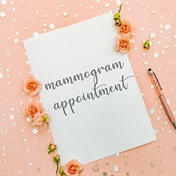Women whose breasts became tender after taking hormone replacement therapy had nearly twice the risk of developing breast cancer than women whose breasts did not become tender on the drugs, US researchers have said.
They said breast tenderness may be a way to identify women who have a higher risk of developing breast cancer while taking hormone replacement therapy to treat menopause.
"We report that an increase in breast tenderness, easily detected by physicians or patients, identifies a population at particular risk for breast cancer," Dr Carolyn Crandall of the University of California Los Angeles and colleagues reported in the Archives of Internal Medicine.
The team analysed data on the more than 16 000 women who took oestrogen-plus-progestin as part of the widely publicised Women's Health Initiative or WHI study, which was halted in 2002 when researchers found healthy menopausal women who took the drugs were more likely to develop breast cancer.
Most of the women in the WHI studies took Premarin or Prempro made by Wyeth.
How the WHI study was done
Doctors now recommend hormone replacement therapy for women suffering severe menopause symptoms, but caution that they should use the lowest dose possible for the shortest period of time.
Crandall and colleagues culled through the data to see if breast tenderness played a role in breast cancer risk.
In the WHI study, 8 506 took oestrogen plus progestin, and 8 102 were given placebo pills. The women had mammograms and breast exams at the start of the trial and every year after that.
They reported whether they had breast tenderness at the beginning of the trial and a year later.
Based on their analysis, the researchers found women who took hormone treatments had triple the risk of developing breast tenderness.
And those who had breast tenderness after taking the pills were at 48% higher risk of invasive breast cancer than other women who took hormone replacement therapy.
The team said the relationship between breast tenderness and breast cancer risk was not clear.
Tenderness ‘could indicate higher risk’
It may be that hormone therapy is causing breast-tissue cells to multiply more rapidly, but the team could not tell that by the study, Crandall said.
"We need to figure out what makes certain women more susceptible to developing breast tenderness during hormone therapy," Crandall said.
The team said breast tenderness while taking combination hormone therapy "may be a marker of increased breast cancer risk," and women who develop breast tenderness after taking the drugs should consult their doctors about whether they should continue on the therapy.
More than 400 000 women die from breast cancer globally each year. About 75% of breast cancers are oestrogen-receptor positive, meaning they are fed by oestrogen. – (Reuters Health, October 2009)
Read more:
Mammograms save lives: study
The problem with dense breasts




 Publications
Publications
 Partners
Partners










